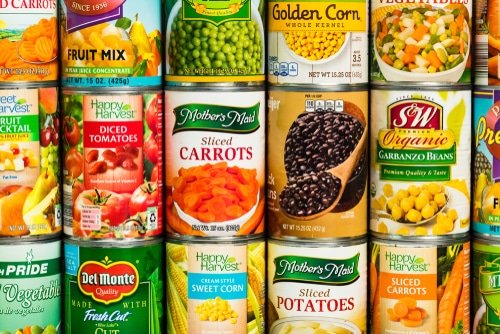Canned food is a staple in most kitchens, but is it enough for survival? While fresh produce is undeniably ideal, canned goods offer a long shelf life and convenient storage, making them a vital component of any preparedness plan. But what is the best canned food for survival?

This blog cuts through the confusion, guiding you towards the best canned food options that are not only nutritious and long-lasting but also surprisingly delicious and versatile. Learn how to stock your pantry with the canned goods that can keep you healthy and satisfied during any emergency.
Why Canned Food for Survival Situations?
When disaster strikes, the last thing you want to worry about is finding fresh food. That’s where canned food shines as a critical component of your emergency preparedness plan. Here’s why canned goods are your reliable allies in survival situations:
Advantages
- Long Shelf Life: Unlike fresh produce, which spoils quickly, canned food boasts an extended shelf life, often lasting several years. This ensures a reliable source of sustenance during emergencies that might disrupt access to fresh groceries.
- Minimal Preparation Required: Forget elaborate cooking in a crisis. Most canned food requires minimal Preparation, making it ideal when resources like electricity or running water are unavailable. Open a can, heat it if possible, or consume it directly for certain options.
- Variety of Options Available: Canned food is far from monotonous. From protein-packed beans and meats to essential vegetables and shelf-stable fruits, you can stock your pantry with diverse options to meet your dietary needs and preferences.
- Generally Affordable: Canned goods are generally budget-friendly compared to other emergency food options. This allows you to build a substantial stockpile without breaking the bank.
Limitations
It’s important to acknowledge that canned food isn’t a perfect solution. While offering a wealth of benefits, there are a few limitations to consider:
- Sodium Content: Many canned goods are packed with sodium for preservation. If you have dietary restrictions or concerns about sodium intake, be mindful when choosing canned food options.
- Limited Freshness: While canned food retains its nutritional value for a long time, it naturally loses some freshness compared to its peak state.
- Can Opener Reliance: A can opener is necessary to access most canned goods unless you choose specific pull-top options. Consider including a manual can opener in your emergency supplies.
Despite these limitations, canned food’s advantages far outweigh them in survival situations. With its long shelf life, convenience, and variety, canned food offers a reliable and accessible way to ensure your nutritional needs are met during emergencies.



Choosing the Best Canned Food for Survival Situations
Now that you understand the advantages of canned food for survival situations let’s delve into selecting the best options for your pantry. Here are some key factors to consider when making your choices:
Nutritional Value: Prioritize canned food rich in essential nutrients like protein, carbohydrates, vitamins, and minerals. Canned vegetables and beans are excellent sources of vitamins and fiber, while canned fish and meat provide protein for maintaining muscle mass and energy levels.
Versatility: Think beyond just opening a can and eating the contents. Choose canned goods that can be incorporated into various recipes. For example, canned tomatoes can be used for pasta sauce, chili, or soups, while canned beans can be added to stews, salads, or burritos. The more versatile a canned good is, the more meals you can create during an emergency.
Shelf Life: Always check the expiration date on canned food and choose long shelf-life items. Proper storage conditions (cool, dry place) are crucial for maximizing shelf life.
Personal Preferences: Don’t stock your pantry solely with foods you dislike! Morale is important in a survival situation. Choose canned goods you find palatable and will enjoy eating, even under less-than-ideal circumstances. Consider dietary restrictions, opting for low-sodium or BPA-free options if necessary.
Top Canned Food Picks for Survival Situations
Now, we get down to the nitty-gritty! Here’s a breakdown of some of the best-canned food options to stock your pantry for survival situations, categorized by their function:
Proteins
Canned Beans (various types): A true pantry staple, canned beans offer a wealth of protein and fiber. Kidney, black, pinto, and chickpeas are all excellent choices, providing a foundation for various meals.
Canned Tuna/Salmon/Chicken: These canned proteins are packed with protein and healthy fats. They can be enjoyed straight from the can or incorporated into stews, salads, or sandwiches.
Canned Lentils: A fantastic source of plant-based protein and fiber, canned lentils are a versatile addition to your pantry. They can be used in soups, stews, or even transformed into hearty lentil burgers.

- Shelf-Stable Meat Pouches: While not technically canned, shelf-stable meat pouches offer a convenient and protein-rich option. These pouches often contain cooked chicken, turkey, or beef and require minimal preparation for consumption.
Vegetables
Canned Tomatoes (diced, crushed, whole): A pantry superstar, canned tomatoes offer endless recipe possibilities. Use them for pasta sauce, chili, soups, or stews. For versatility, opt for diced or crushed tomatoes.
Canned Vegetables Rich in Vitamins: Stock up on canned vegetables like carrots, peas, green beans, and corn. These options provide essential vitamins and minerals, helping maintain a balanced diet during emergencies.
Canned Mixed Vegetables: While not the most exciting option, canned mixed vegetables offer a variety of vitamins and fiber in a single can. They’re a great way to add color and nutrients to emergency meals.
Fruits
- Canned Fruits Packed in Water or Juice: While fresh fruit is ideal, canned fruits packed in water or juice offer a good alternative for emergencies. Applesauce, peaches, and pears are all delicious and provide essential vitamins.
Pantry Staples
Canned Soups (various flavors and broths): Canned soups offer a quick and easy meal solution. Choose low-sodium varieties whenever possible and stock a variety of flavors to suit taste preferences. Broth-based canned soups can also be a good source of hydration.
Canned Pasta Sauce is a pantry must-have for pasta lovers. It allows you to whip up a satisfying meal with minimal effort.
Canned Beans in Various Broths: Beans offer protein and fiber, but choosing canned beans in broth adds another layer of flavor and provides additional hydration, which can be crucial in survival situations.
Bonus Tips for Using Canned Food in Survival Situations

Now that you have your pantry stocked with the best-canned food options, here are some bonus tips to maximize their usefulness in a survival situation:
Storage is Key: Proper storage extends the shelf life of your canned goods. Store them in a cool, dry place away from direct sunlight. A basement or pantry is ideal.
Beyond the Can Opener: While a can opener is the most convenient way to access canned food, consider having a manual can opener as a backup in case of power outages. There are also special tools that allow you to open cans without an opener, but these might be less efficient.
Cooking Without Electricity: Don’t despair if the power goes out! You can still cook canned food using alternative methods. A camp stove, fireplace, or even a simple grill can be used to heat canned goods.
Get Creative in the Kitchen: Canned food might not seem exciting, but with a little creativity, you can create delicious and satisfying meals. Look for recipes online or in cookbooks specifically designed for using canned goods. A simple internet search can yield surprising and tasty results!
Don’t Forget the Seasonings: Having a small stock of spices and herbs in your pantry can significantly elevate the flavor of your canned food creations. Salt, pepper, garlic powder, onion powder, and chili flakes can go a long way in adding variety and taste to your emergency meals.
Conclusion
Having a well-stocked pantry with the right canned food options provides peace of mind and ensures you’re prepared for unexpected emergencies. Remember, the key is to choose canned goods that are not only nutritious and long-lasting but also palatable for you and your family.
Take Action!
- Create a Personalized Emergency Food Plan: Consider your dietary needs and preferences when building your canned food stockpile. Don’t forget to factor in the needs of any family members with allergies or dietary restrictions.
- Start Small, Build Gradually: You don’t need to stock your pantry overnight. Add a few canned goods each week until you have a comfortable stockpile.
- Rotate Your Stock: Pay attention to expiration dates and rotate your canned food regularly to ensure freshness. Don’t forget to update your emergency food plan as your needs or preferences change.
By following these tips and building a well-rounded canned food pantry, you’ll be well on your way to being prepared for any emergency. Stay safe and prepared!



